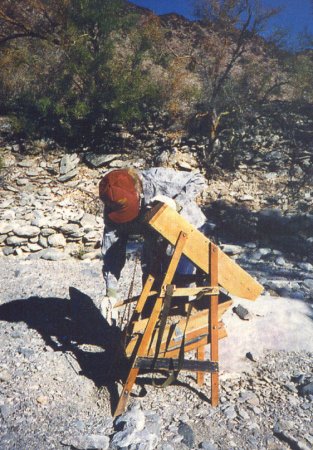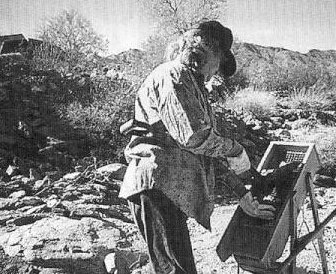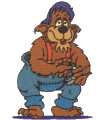BY BOB RETHWISH
Learning to Dry-wash Effectively
 I had just driven back to our mining claim seven miles northeast from the town of Quartz site, Arizona. As I stepped into our travel trailer, I warned my wife, Norma, “Don’t look into the back of the truck.” Of course, she immediately looked out the dining room window and said, “I don’t see anything.”
I had just driven back to our mining claim seven miles northeast from the town of Quartz site, Arizona. As I stepped into our travel trailer, I warned my wife, Norma, “Don’t look into the back of the truck.” Of course, she immediately looked out the dining room window and said, “I don’t see anything.”
I sat down at our small kitchen table and explained, “You don’t see anything because I covered it with that old army blanket. Now promise me you won’t go out and…” She jumped up from reading her cookbook and dashed for the door. Being closer than I was, she escaped easily. By the time I got to the door, she was throwing the blanket back.
I hollered to no avail, “Tomorrow’s your birthday!” Without looking at me, Norma said, “So… ?” And then she screamed, “A drywasher! Let’s go try it out.” When I reached the truck I said, “Let’s at least wait ’til after lunch.” She was running around grabbing shovels and buckets and said, “I’m not hungry.” God knows that wasn’t true–she’s always hungry!
Our love for gold began in the early 1980’s when I got Norma an inexpensive White’s metal detector for Christmas. Traditionally we open one present on Christmas Eve; and she, by chance, unwrapped her metal detector. When I went to bed hours later, Norma still had all her unwrapped presents spread over the playroom floor and she was busy checking each one with the detector. As I drifted off, I heard the detector sound off once again and Norma mutter, “Aha!” and, “I know what that is,” and “Hmmm.”
From that seemingly innocent Christmas gift, our lives changed dramatically.
Originally, after spending a summer dredging, we traveled to Quartzsite, Arizona to sell our gold and gold jewelry at swap meets on the weekends. This normally inconspicuous little town with RV parks and BLM open desert camping, just east of the California border on Interstate 10, balloons from a few thousand permanent residents to well over half a million people during the winter! It has a real circus atmosphere, the main attraction being the rock and mineral displays at a multitude of swap meets and shows. In the midst of all this are airplane rides, balloon and buggy rides, side shows, live music, antique sales, and perhaps a little junk. And let’s not forget the food vendors, guaranteed to satisfy any craving (except Norma’s). We came to sell our gold, we saw what was going on, and we stayed.
Shortly thereafter, we claimed 20 acres in the foothills, seven miles south-west of town. That was14 years ago. This is where we still dry-camp and dry-wash for gold during the winter months. It’s R and R (rest and relaxation).
Our first dry-washer was gas-powered and larger than I cared for. It did a great job, but after dredging all summer, I needed a reprieve from hard physical work. After all, I was in my fifties.
Remember that classic Lucille Ball routine where she and Ethel Mertz worked on a conveyor belt packing chocolates, and couldn’t keep up? That’s how I felt with that large dry-washer. One day, right after dry-washing, I was sitting in our truck, exhausted. I started the truck and I remember Norma hollering, “Stop! You’re going to run right over the dry-washer!” I think I was subconsciously trying to destroy it. “Let’s sell it,” Norma said, “while we still have one to sell.” We traded it for a gold spinner the next day.
It was a few years later when I bought the inexpensive, hand-operated dry-washer, which brings me back to Norma pulling the blanket off of it.
We went out that first day and truly enjoyed ourselves. As we headed for the wash, Norma said, “Remember all those characters who came out here years ago to dry-wash? I’ve been thinking about all the things they did and said that I didn’t pay much attention to at the time. I forget his name, but there was that older guy that came out on a motorbike with his dry-washer and his bucket, shovel, and lunch box all strapped to him and his motorbike. You know who I mean. Well, he said to find an area in the wash where the caliche (a desert hardpan, almost like cement or bedrock) took a dip and formed a basin where the gold would settle. I remember him so vividly. I was always amazed when I saw him on that little motorbike with only his eyes showing.”
We arrived at the wash and Norma said, “I’ll show you what he was talking about.” She found a low spot in the overburden and continued, “Like right here.”
I agreed and said, “Well, let’s try it.” Norma, however, was still looking things over and she warned, “I remember he also said to keep in mind where the origin of the gold might be and which side of the wash could have been an old river bed, and to get close to both”
While she was looking around, I went back to our truck, which was parked nearby, and picked up the dry-washer. When I arrived back at the wash, I asked her where she thought we should start. She pointed with the shovel and said, “The mountains are there. That would be the origin, and I checked that bank and it looks like an old river bed.” She motioned to a spot and added, “I think that’s a good spot.”
So we started and took turns operating the handle and shoveling into the dry-washer. The person pumping the handle sat on an upside-down 5-gallon bucket, and took in the scenery; it was a cushy job.
After a while, I got up from the bucket and told Norma, “I know you’re not hungry, but I’m going to walk up that rise and have lunch.” “Go ahead, I’ll keep going for awhile,” Norma answered. “Aw heck, if you’re going to eat, I might as well eat, too.” We climbed up and found a comfortable rock in the warm sun. Directly behind us were the Dome Rock Mountains, but toward the east we had a panoramic view of the Kofa mountains, maybe 20 miles away. We could also see our trailer bordering a small hill that we had named ” Almost hill.”
 After a few bites of her sandwich, Norma pointed and said, “That looks like jade.” She slid down about 15 feet and knelt to dig, the best she could do with a sandwich in one hand. She stood up to talk to me and spooked a doe, which immediately bounded away, leaving a yearling frozen in its tracks. The doe turned and squealed. The baby bounded down the hill awkwardly, and they happily reunited. It was an unequaled thrill.
After a few bites of her sandwich, Norma pointed and said, “That looks like jade.” She slid down about 15 feet and knelt to dig, the best she could do with a sandwich in one hand. She stood up to talk to me and spooked a doe, which immediately bounded away, leaving a yearling frozen in its tracks. The doe turned and squealed. The baby bounded down the hill awkwardly, and they happily reunited. It was an unequaled thrill.
—Norma shovels into the dry-washer–
We finished lunch and continued dry-washing. When we reached the caliche, Norma told me a guy with a red scraggly beard had told her to take a lot of time brushing the hard surface, making sure it was absolutely clean, as the gold stops there. He did find more gold than most, so we decided to give the caliche a good cleaning. We put the “brushings” thr through the dry-washer and decided to clean-up. We had dry-washed for only an hour, but were anxious to see how we were doing.
Norma carefully removed the sluice and transferred the concentrates to the bucket we had been sitting on. We returned to our trailer and she started panning into a shallow tub filled with water. As I unloaded the truck, I heard Norma casually say in a sing-song voice, “You won’t believe what I just found.”
I walked to her and there it was–a beautiful, bright gold nugget, contrasted against the green gold pan. It was jagged and rough, not river-worn like we were accustomed to.
Norma tilted the pan toward me and said to start backing up. She told me to back up until I couldn’t see the gold nugget, and then to take a step forward. When I was a good distance away, I hollered to Norma that I couldn’t see it, then I took a step forward to where I could just barely see the nugget. Norma put the pan and nugget on the ground at her feet and said “Stay right there.” She got a carpenter’s tape and measured the distance between me and the nugget. It was 49 feet, exactly. We named it our “49’er nugget.”
As we finished panning, it began to rain. We knew we couldn’t dry-wash when the ground was wet, so we grabbed a plastic tarp, drove out to the claim, and covered the area where we had found the nugget. It takes a lot of rain to really soak up an area, so a tarp usually does the job.
Reflecting back on those first years with our dry-washer, we also followed a tip from a guy called “The Professor,” and started taking a tub and water out to the claim with us so we could pan out on site. We’d dry-wash, have a picnic, and pan right there. Life doesn’t get any better than that!
Another guy, a skinny, suntanned nudist who sometimes wore a dress (really!), had a 10-foot extension to his dry-washer sluice. I personally don’t think it was worth the trouble. That guy did have one good idea, however. When he changed locations, he always cleaned his sluice, so he would know how much gold came from each location. He called it “proper sampling technique.”
What this is all leading to is that we’ve learned by watching, listening, and then doing. Just go do it. Those who have the right approach certainly do seem to recover more gold and make the exciting strikes! You’ll have fun and the gold you get will be a bonus!
Well, Norma is looking out our trailer window towards our mining area.
Excuse me, but I have to fix some sandwiches.
- More articles about dry-washing
- More about how to prospect for gold
- More Gold Mining Adventures
- Schedule of upcoming events
- Books and Videos by Dave McCracken





